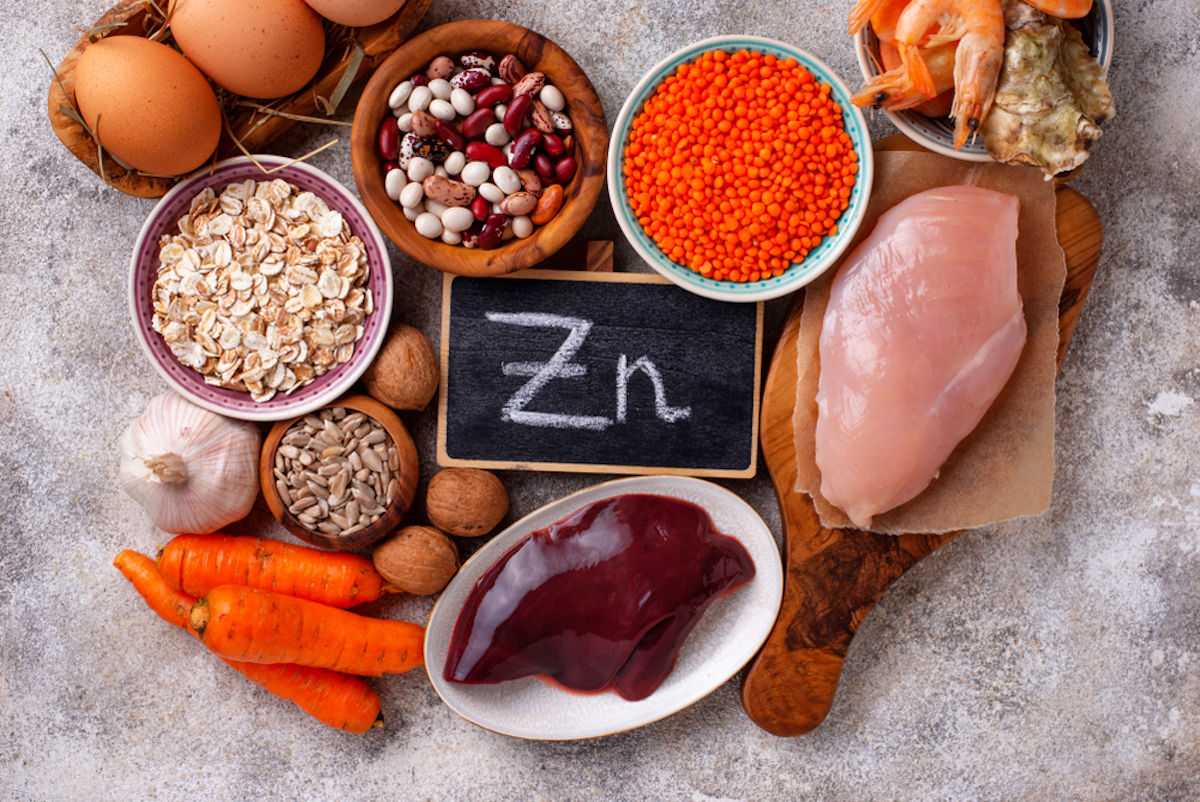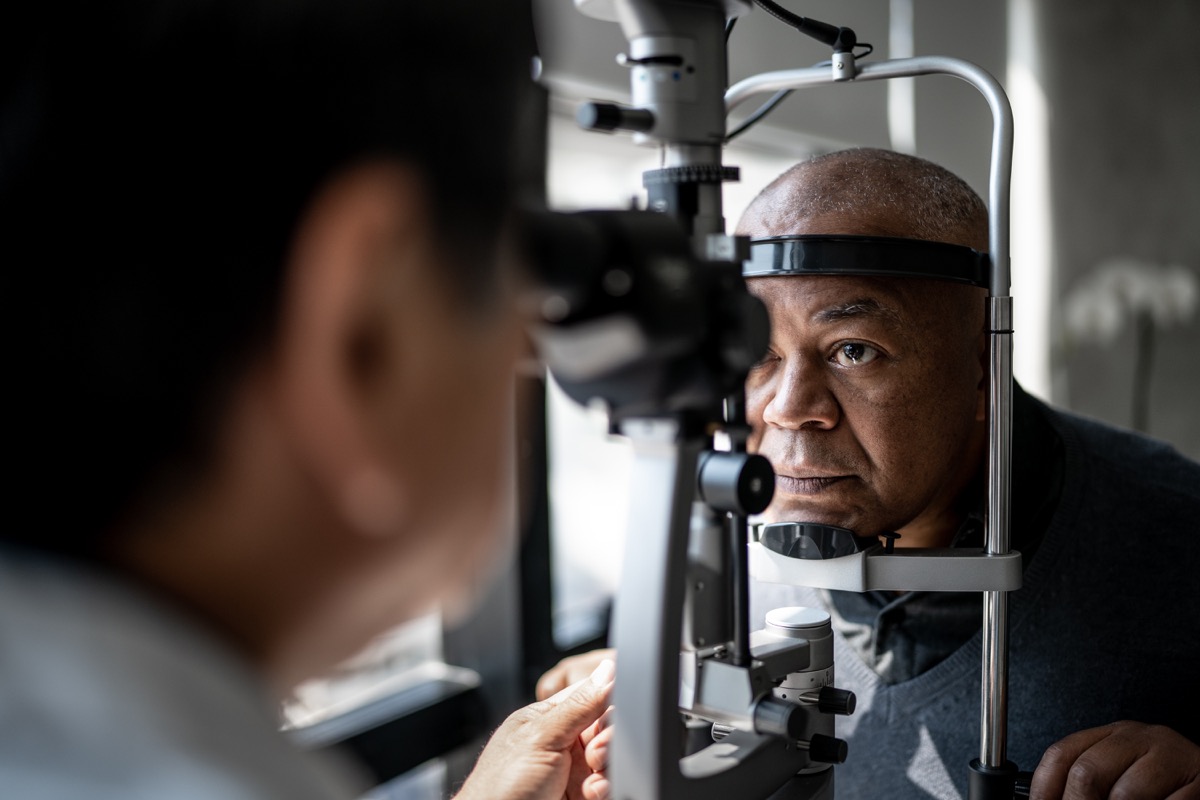7 Surprising Benefits of Taking a Zinc Supplement

Zinc is a mineral and an essential nutrient that your body uses for a range of basic functions, from DNA production and cell growth to bolstering your immune system. You can get zinc from both plant- and animal-based dietary sources, as well as from zinc supplements. However, given its wide range of benefits, some people who take zinc supplements are looking to achieve specific improvements to their health.
Wondering what you stand to gain by adding a zinc supplement to your regimen? These are the seven surprising benefits of taking zinc, or eating more zinc-rich foods.
RELATED: 21 Surprising Signs You Have a Vitamin Deficiency.
How Much Zinc Do You Need Daily?

As with other supplements, it’s important to aim for the Recommended Daily Allowance (RDA) of zinc—and not more.
“The RDA for zinc varies by age, sex, and life stage,” explains Avery Zenker, RDN, a dietitian working with Everflex Fitness. “For adult men, the RDA is 11 milligrams per day, while for adult women, it’s eight milligrams per day. Pregnant and breastfeeding women need higher amounts, around 11 to 12 milligrams per day.”
“To avoid potential toxicity, it’s not recommended to exceed the Tolerable Upper Intake Level (UL), which is 40 milligrams per day for adults,” she adds.
However, it’s always a good idea to check in with your doctor before beginning any new supplementation plan. Zenker notes that your medical team can help you assess your zinc needs on an individual basis, especially if certain health conditions are present.
RELATED: 6 Surprising Benefits of Taking an Iron Supplement.
Who Might Benefit From a Zinc Supplement?
According to Lauren DeDecker, MD, an internal medicine physician and popular medical content creator, you should only take a zinc supplement if it has been recommended, or at least cleared, by your physician.
“Zinc deficiency is not very common in developed countries such as the U.S.,” she tells Best Life.
However, besides a known deficiency, there are a few particular reasons that a person might want to discuss taking zinc supplements with their doctor.
“Individuals who might benefit from zinc supplements include… people who have had bariatric surgery, people with gastrointestinal diseases that impair nutrient absorption (like celiac disease or IBD), pregnant and breastfeeding women, and individuals with chronic illnesses or those recovering from surgery or wounds,” says Zenker.
“Older adults may also benefit if they have a poor appetite. Those who are unable to consume adequate amounts of zinc-rich foods can also benefit. Vegetarians and vegans may also consider zinc supplements since zinc bioavailability is decreased in plant-based foods that contain phytates, like legumes,” she adds.
RELATED: 9 Supplements That Can Damage Your Stomach, Doctors Say.
How to Get Zinc Through Your Diet

There are several foods that are rich in zinc and can likely provide all you need.
“Oysters contain the highest amount of zinc per serving, at about 32 mg per three ounces,” Zenker says, noting that other seafood, like crab and lobster, are also particularly rich in zinc. “Beef, pumpkin seeds, fortified cereals, poultry, oats, cheddar cheese, lentils and beans, tofu, hemp seeds, and wheat germ are other sources of zinc,” she continues.
Liver, chicken, chickpeas, sunflower seeds, cashews, pecans, and scallops are other good sources, DeDecker adds.
RELATED: 7 Surprising Benefits of Taking Magnesium Every Day.
7 Surprising Benefits of Taking a Zinc Supplement
Those with adequate zinc levels are less likely to benefit from zinc supplements, but people whose levels are low may notice significant changes. These are the seven surprising benefits you may experience, experts say.
1. Immune system support

One of the most common reasons people take zinc supplements is to boost their immune system during cold and flu season.
“Zinc is essential for the proper function of the immune system. It helps in the production and activation of T-cells, which are crucial for immune responses,” explains Zenker. She notes that some research suggests that adequate zinc intake can reduce the length and severity of infections.
However, Kimberley Wiemann, MS, RDN, a registered dietitian, owner of Kimberley Wiemann Nutrition, and nutrition consultant for Consumer Health Digest, suggests that more research is needed to confirm its benefits for acute infections.
“Studies show that if someone starts taking zinc within 24 hours of symptoms developing, then symptoms can be reduced. However, other studies have shown little to no effect,” she says.
2. Wound healing

If you have an injury, zinc supplements may also help you speed up the healing process since zinc deficiency can impair wound healing.
“Zinc plays a significant role in maintaining skin integrity and structure. It’s involved in collagen synthesis, cell proliferation, and immune function, all of which are necessary for wound healing,” says Zenker.
However, taking additional zinc when zinc status is adequate may not impact your injury.
3. Growth and development

Another surprising benefit of taking a zinc supplement is that it can benefit fetal development in pregnant women, Zenker says.
According to the World Health Organization (WHO), “The central role of zinc in cell division, protein synthesis and growth means that an adequate supply of zinc is especially important for pregnant women. During pregnancy, zinc and other micronutrient deficiencies are common due to increased nutrient requirements of the mother and the developing fetus.”
4. Skin health

Zenker says some people take zinc supplements for their dermatological benefits. She notes that zinc can also support healthy hair and nails.
“Zinc has anti-inflammatory properties and can help in the treatment of acne and other skin conditions. It regulates oil production in the skin and may protect against bacterial infections and inflammation,” she explains.
5. Reduced inflammation

In fact, zinc’s ability to reduce inflammation may also have broader health implications.
“Zinc has antioxidant properties that help combat oxidative stress and inflammation. This can be beneficial in reducing the risk of chronic diseases such as cardiovascular disease and certain cancers by mitigating damage caused by free radicals,” Zenker says.
6. Fewer gastrointestinal problems

According to a 2022 meta-analysis of nine studies published in the journal Nutrients, zinc deficiencies are common among people who suffer from Irritable Bowel Disorders (IBD) including Crohn’s disease (CD) and ulcerative colitis (UC). Though the researchers stopped short of confirming causality, they found that half of people with those conditions also had a zinc deficiency.
“The present research highlights the importance of considering zinc as a micronutrient to be monitored, because every second IBD patient shows a deficiency,” the study states. “According to our results, zinc deficiency is more prevalent in the CD population, probably due to the more severely malabsorptive nature of this condition and also in light of the proximal site of zinc absorption in the intestine.”
Zenker notes that some people take zinc in order to reduce symptoms of IBD.
7. Reduced risk of age-related macular degeneration

Finally, there’s some preliminary research to suggest that people who have adequate zinc levels may be less likely to develop age-related macular degeneration (AMD), an eye disease that can cause blurred vision and vision loss.
“Unfortunately, there is no known treatment to prevent the early stages of AMD. Yet, taking zinc supplements may delay the progression of advanced AMD, thereby helping to preserve your vision for longer if you have been diagnosed with intermediate or advanced AMD,” write experts from Cove Eyecare.
According to a 2020 study published in the International Journal of Molecular Sciences, “the effect of zinc on AMD incidence may be modulated by the individual genetic background.” For instance, one team of researchers concluded that zinc supplementation was proficient for patients bearing a high-risk allele of the CFH gene, the study authors wrote.
RELATED: 12 Supplements You Should Never Take Together, Medical Experts Say.
Risks and Side Effects of Zinc Supplements

Taking oral zinc supplements may cause certain side effects, including indigestion, diarrhea, nausea, headaches, and vomiting. Prolonged use of zinc in high doses can also lead to copper deficiency, which can, in turn, cause anemia, neurological problems, osteoporosis, irregular heartbeat, and more.
DeDecker warns that zinc taken as a nasal spray poses additional risks: “People should not use intra-nasal zinc (such as homeopathy remedies) as this poses the risk of permanent loss of smell.”
Speak with your doctor to learn more about the risks and benefits of zinc and whether a zinc supplement might be right for you.